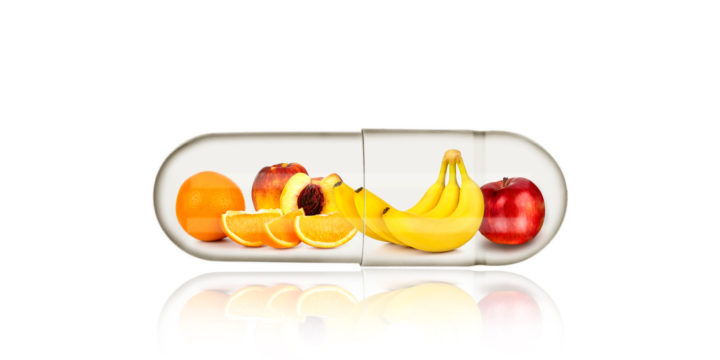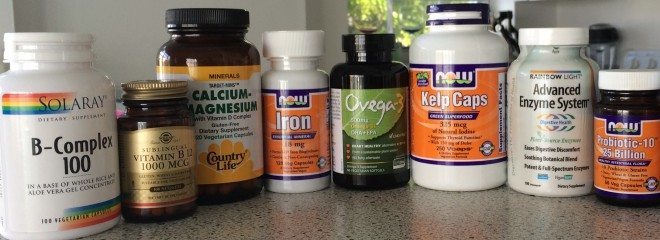One of the most common questions I receive (after, “How do you get your protein?”) is, “Do you take supplements? and “Don’t vegans need to supplement to get all your nutrients?”
I have been vegan 18 years (vegetarian 26 years) and during that time I have heard so much conflicting information from different people and groups. Most information had had very little, unbiased, conclusive research to back it up. Only recently has scientific data started to be published on the subject. Upon learning about this new research, I went from taking only B-12, to adding 5 more nutrients to my list of supplements that I feel I may need.
My base reason for maintaing a vegan diet is, and always has been my strong belief that it is not okay to harm, kill, or exploit animals for any reason. I mention this now because personally, no matter what the scientific data tells us, I will remain vegan until the day I die because I want my actions to match my values.
That being said, my mission in life, in addition to changing the way our culture views and treats animals and the environment, includes helping humans live the healthiest, happiest lives possible. The awesome thing about this is that we can achieve all three components of my mission with one solution… a well-balanced, whole foods, plant-based diet!!!
I am writing this article to present the most up to date information I am aware of when it comes to getting all the nutrients we need, in the right amounts, to live long, quality lives. Here are the 6 nutrients people on a vegan diet need to pay closest attention to:
1. B-12
Every single person on a vegan diet, no matter how balanced and healthy you eat, must supplement their diet to get the appropriate levels of B-12 in their system. For more information on why this is the case, click HERE. The simplest way to ensure you get enough is taking an oral supplement. There are many B12-fortified foods on the shelves, such as certain cereals and nut milks, but instead of trying to make sure you eat those specific foods every day, I recommend simply taking a supplement. The recommended amount is either a single dose of 2,500 mcg per week, or a daily dose of 250 mcg in the form of a chewable, sublingual, or liquid vitamin. You may not experience any symptoms of B12 deficiency until you have irreversible neurological damage.
2. DHA
There is research that shows one reason people, and for some reason vegans especially, can have health problems later in life is due to a consistently high omega 6:omega 3 fatty acids. Omega 6 fatty acids are pro-inflammation, and omega 3 fatty acids are anti-inflammation. For more on inflammation click HERE. We need both to survive, but in general, we are consuming way too much omega 6, and too little omega 3. We can get the short-chain omega 3 fatty acids from several plant-foods such as flax seeds and walnuts, however we usually cannot convert enough of this form, to the long-chain omega 3 fatty acid DHA. It is therefore recommended for those on a plant-based diet to take a vegan, algae-based DHA supplement. In fact, I tell everyone taking a fish oil to switch to an algae-derived supplement (where do you think the fish get the omega 3s from? Why risk the heavy metal contamination and sea environmental destruction to get the fish oil, when we can easily grow the algae in a controlled environment without contaminants or sea devastation!)
3. Calcium
Despite the common myth that we need cow’s milk to get enough calcium, it’s certain green vegetables that have the highest absorption rate. You will actually absorb more calcium from broccoli, kale, and bok choy than cow’s milk, and soybeans absorb calcium equally as well as cow’s milk. Higher oxilate-containing greens, such as spinach and beet greens however, have poor calcium absorption. Therefore, if you are eating enough of the calcium-containing foods with good absorption and/or eating enough calcium-fortified foods, you may very well be getting in your recommended daily value of calcium, which is (according to the National Institute of Health in 2013) 2,500 mg for adults age 19-50, 2,000 for ages 51+ (see HERE for more) . If this is not the case however, a calcium supplement is appropriate to prevent osteoporosis down the road.
4. Iron
Most of us were raised believing we need to eat cows (red meat) to get iron in our diets. This is not at all true. Many plant foods are high in iron like chick peas and pumpkin seeds, and the iron is absorbed particularly well when we eat these with foods high in vitamin C like broccoli and citrus. We have to be careful though… if we don’t absorb enough, we risk anemia, but if we absorb too much, our bodies can become overloaded, causing oxidative stress, a boost of free radicals, all greatly increasing our risk for cancer. Our intestines are able to help regulate our iron levels by absorbing more from plant foods if we are low, and absorbing less if we are levels are “in the sweet spot.” BUT this is only true for plant foods. Interestingly, intestines cannot play this same role for iron in blood from animal foods non-vegans consume. It is recommended, that before deciding to take an iron supplement, you have your iron levels checked and only begin a careful iron supplement regiment if your level is low.
5. D
Vitamin D is a tricky one. Recently it has been discovered that the majority of Americans (vegan and omnivores alike) are vitamin D deficient. Vitamin D plays a more important role in preventing chronic disease than we once thought. With the right amount of sunlight, it is possible, but not probable to get the recommended amount. Knowing if you are getting the enough sun on enough of your skin is difficult and depends on your location in the world and time of year. Plus, it is thought that sunscreen negates our ability to make vitamin D from the sun, and without sunscreen we put our skin at great risk for harmful aging and cancer-causing UV rays thanks to ozone depletion. There are few foods that contain vitamin D in ideal amounts. Basically, I’m saying that there is a good chance you need to eat fortified foods and/or supplement. Many nut milks and cereals on the grocery shelves are fortified with vitamin D, but again, if you are not consuming enough consistently this way, a supplement may be a good idea.
6. Magnesium
The health benefits of magnesium was, for a long time, underestimated. Magnesium favorably affects our risks for insulin resistance, and many of our top killers like hypertension, type 2 diabetes, and cardiovascular disease. Magnesium acts to help in the production of ATP (the energy molecules of your body), the action of your heart muscle, formation of bones and teeth, relaxation of blood vessels, regulation of bowel movements, and regulation of blood sugar levels. Important stuff! Magnesium is found in leafy greens, legumes, nuts, seeds, and whole grains. Some of the foods highest in magnesium include seaweed (agar), pumpkin seeds, flaxseeds, cocoa, and almonds. Therefore, if you are eating a balanced, whole foods, plant-based vegan diet, you very well could be ok. Most vegans and vegetarians have higher magnesium levels than most meat-eaters for that reason. So why am I mentioning it? My hope is that working out is a large part of your life routine, and since we loose some magnesium through sweat, and magnesium has been found to aid in recovery, it is something to take note of! So if you are not getting at least the recommended amount (400 mg, see HERE for details) of magnesium daily, you may want to supplement. A magnesium-calcium-D combination supplement could be the best option because they all work synergistically and maintaining a proper ratio is also important.
7. Iodine
It has recently come into the spotlight that many health-conscious vegans are deficient in iodine, something I had never heard before. If you are like me, and do not consume iodized salt regularly (I only keep non-iodized Himalayan and Celtic sea salt in my home), eating sea vegetables/seaweed on a regular basis can be the easiest way to ensure adequate levels. Kelp however, is so loaded with iodine that it can cause an iodine overdose which can adversely affect your thyroid, so be careful. On the other end of the spectrum, it was found that vegans that ate certain healthy foods, like flaxseeds and broccoli, that contain what’s called a goitrogenic compound which can interfere with thyroid function in those with inadequate iodine levels. The RDA recommends 150 mcg per day (with the upper limit set at 1,000 mcg by the World Health Organization), while some experts believe this is too low for many people.
I realize that all of this can seem overwhelming. It is important however, to do our best to soak in the information, take a look at our diets, and see if anything we are eating, or not eating, could be causing us imbalances with the potential for harm. This is important for EVERYONE to do, not just vegans by the way. Many times, signs and symptoms of deficiencies are not recognized or diagnosed until irreversible damage. If you take away one point from this article however, let it be that all vegans must consume a B12 supplement for optimal health!
Ella Magers, MSW
Latest posts by Ella Magers, MSW (see all)
- When Crisis Calls: Finding Peace in Purposeful Action - January 10, 2025
- Fierce Compassion: Guide to Grieving, Celebrating, and Living Fully - January 7, 2025
- Your 30-Second Health Hack for the New Year: “Greens Insurance” - December 27, 2024
- Manifesting Your Best Year: The Art of Setting Soulful Intentions - December 27, 2024
- The Power of Collective Compassion: Prayers for Chef AJ - December 21, 2024


